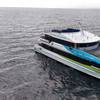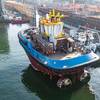Transpetro: Bid for 8 Ships by Year End
Transpetro will launch, by the end of this month, a new bid in view of contracting eight ships to be used for the transportation of oil by-products, in the second phase of the Fleet Modernization and Expansion Program (Promef). Five of those product ships, with a capacity to carry 30 thousand deadweight tons, each, were to be built by the shipyard Rio Nave (RJ), which had executed a contract with the subsidiary of Petrobras. The other three were being negotiated with Estaleiro Mauá, but no agreement was reached in terms of prices and the agreement was not signed. With the cancellation of the two bids, the eight ships will now be bid out in two lots.This month, Rio Nave and Transpetro agreed to cancel the agreement for five product ships with a capacity of 30 thousand tons because the shipyard failed to produce, within the stipulated term, the necessary documents to allow the start of the construction of the ships. These documents – guarantees of technical, financial, and operating conditions – would render the agreement “effective”, that is to say, they would enable the start of the work. The bid held in view of the construction of three product ships with a capacity of 45 thousand tons, in turn, was cancelled in November.
Estaleiro Mauá, which disputed this three-ship lot, has another agreement with Transpetro, which is fully effective, for the construction of four product ships, with a deadweight capacity of 48 thousand tons, each. Two of those ships – Celso Furtado and Sérgio Buarque de Holanda – were already put to sea this year.The other two shipyards in Rio de Janeiro that have effective agreements are Eisa – which is building four Panamax oil tankers – with a deadweight capacity of 73 thousand tons, each, and Superpesa, which was contracted to manufacture three bunker transportation ships (ship fuel). Of the 49 ships comprising Promef (23 in phase I and 26 in phase II), 41 have already been contracted, with an investment of R$ 9.6 billion. Out of those, 11 ships are being built in the State of Rio de Janeiro, and another 30 in the State of Pernambuco, by the shipyards Atlântico Sul and Promar. In 2011, six additional ships are expected to be launched under the program.













